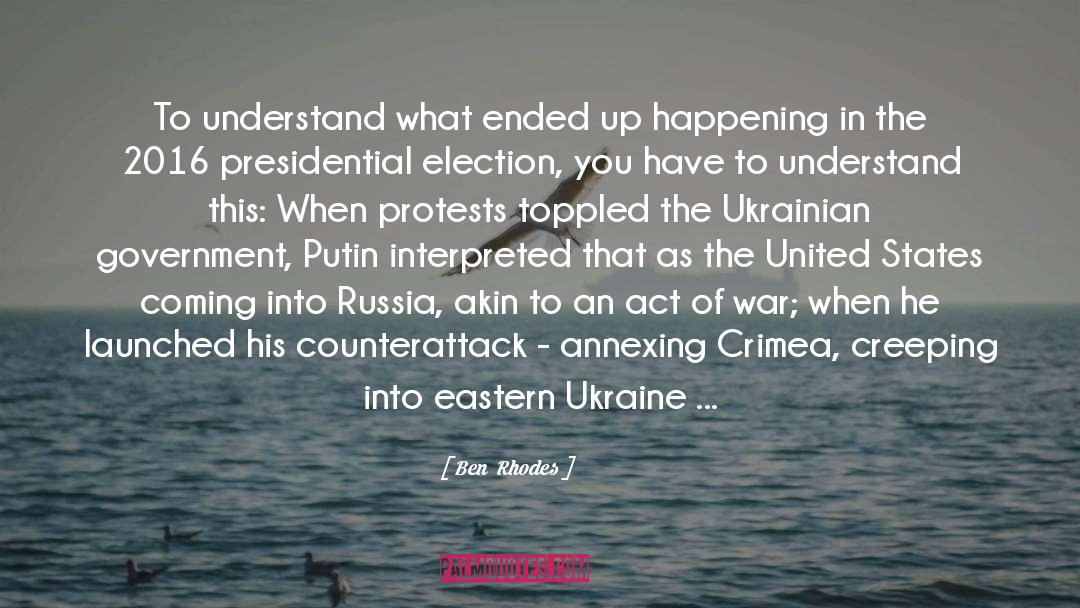Ben Rhodes Famous Quotes
Reading Ben Rhodes quotes, download and share images of famous quotes by Ben Rhodes. Righ click to see or save pictures of Ben Rhodes quotes that you can use as your wallpaper for free.
I came to realize that this was about more than not offering up what some of his opponents craved - the picture of the angry black man, or the lectures on race that fuel a sense of grievance among white voters. Obama also didn't want to offer up gauzy words to make well-meaning white people feel better. The fact that he was a black president wasn't going to bring life back to an unarmed black kid who was shot, or alter structural inequities in housing, education, and incarceration in our states and cities. It wasn't going to change the investment of powerful interests in a system that sought to deny voting rights, or to cast people on food stamps working minimum wage jobs as "takers," incapable of making it on their own. The "last person who ever thought that Barack Obama's election was going to bring racial reconciliation and some "end of race" in America was Barack Obama. That was a white person's concept imposed upon his campaign. I know because I was once one of them, taking delight in writing words about American progress, concluding in the applause line "And that is why I can stand before you as president of the United States." But he couldn't offer up absolution for America's racial sins, or transform American society in four or eight years.
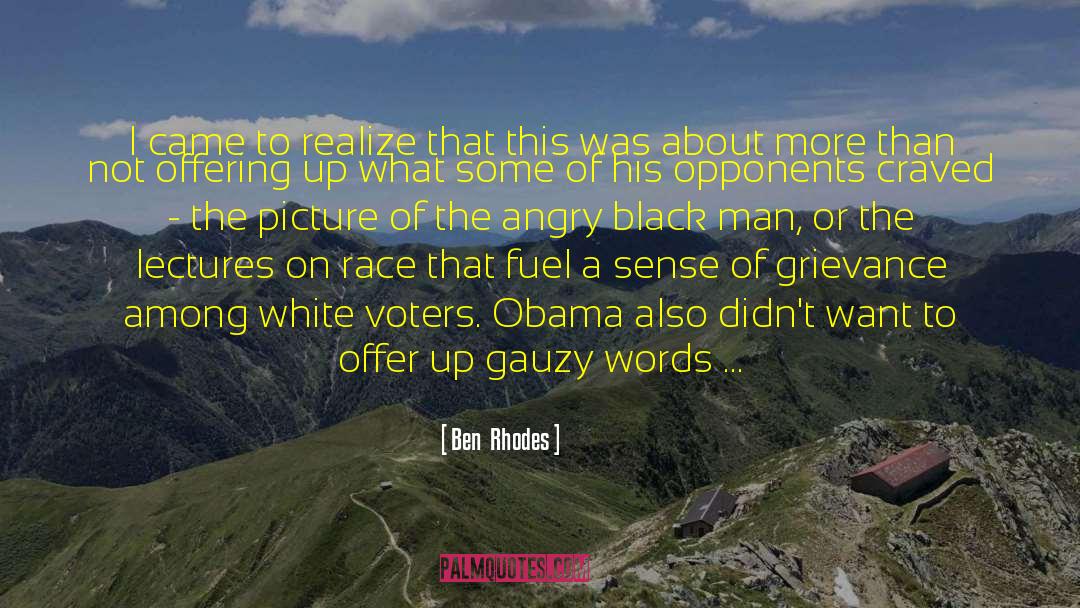
Laos is the most heavily bombed country in the history of the world. From 1964 to 1973, the United States dropped more than two million tons of ordnance on Laos to disrupt the Ho Chi Minh Trail and try to stanch a Communist insurgency - more than was dropped on all of Germany and Japan during World War II. There were 580,000 bombing missions, which averages out to one every eight minutes for nine years. Sometimes, U.S. planes returning to Thailand from missions over Vietnam indiscriminately dropped their remaining bombs on Laos. More than 270 million cluster munitions - "bombies" - were used, and 80 million of them failed to detonate. In the four decades since the end of the war, only 1 percent have been cleared. More than fifty thousand people have been killed or injured in UXO accidents; over the last decade, nearly half of those casualties have been children.
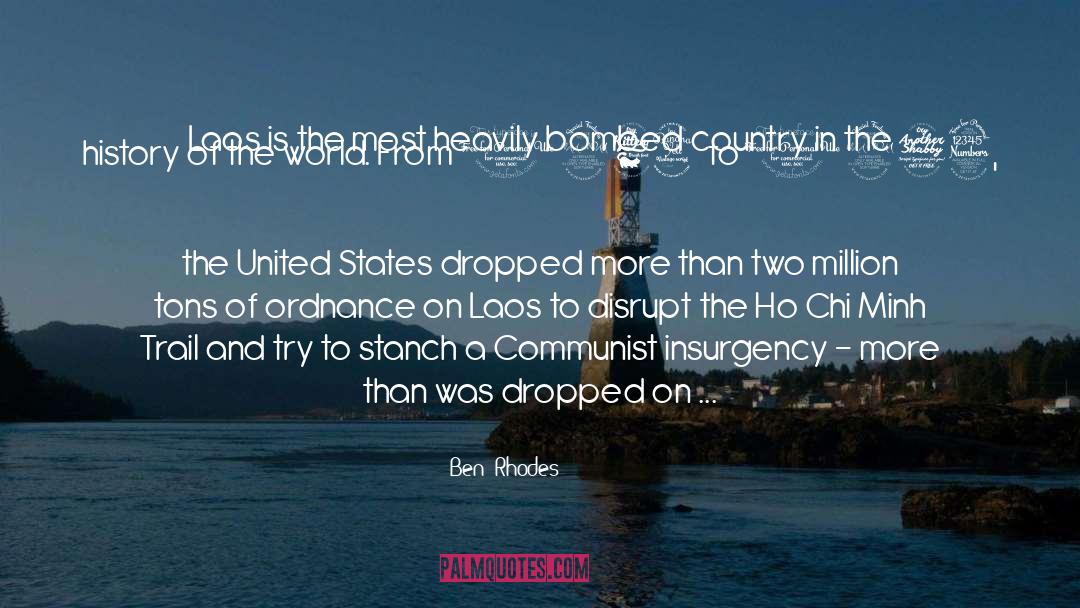
Obama was the most powerful man in the world, but that didn't mean he could control the forces at play in the Middle East. There was no Nelson Mandela who could lead a country to absolution for its sins and ours. Extremist forces were exploiting the Arab Spring. Reactionary forces - with deep reservoirs of political support in the United States - were intent on clinging to power. Bashar al-Assad was going to fight to the death, backed by his Russian and Iranian sponsors. Factions were going to fight it out in the streets of Libya. The Saudis and Emiratis were going to stamp out political dissent in Egypt before it could come to their kingdoms. A Likud prime minister was going to mouth words about peace while building settlements that made peace impossible. Meanwhile, innocent people were going to suffer, some of them were going to be killed, and there didn't seem to be anything I could do about it. Obama had reached that conclusion before I had. History had opened up a doorway in 2011 that, by the middle of 2013, had been slammed shut. There would be more war, more conflict, and more suffering, until - someday - old men would make peace.
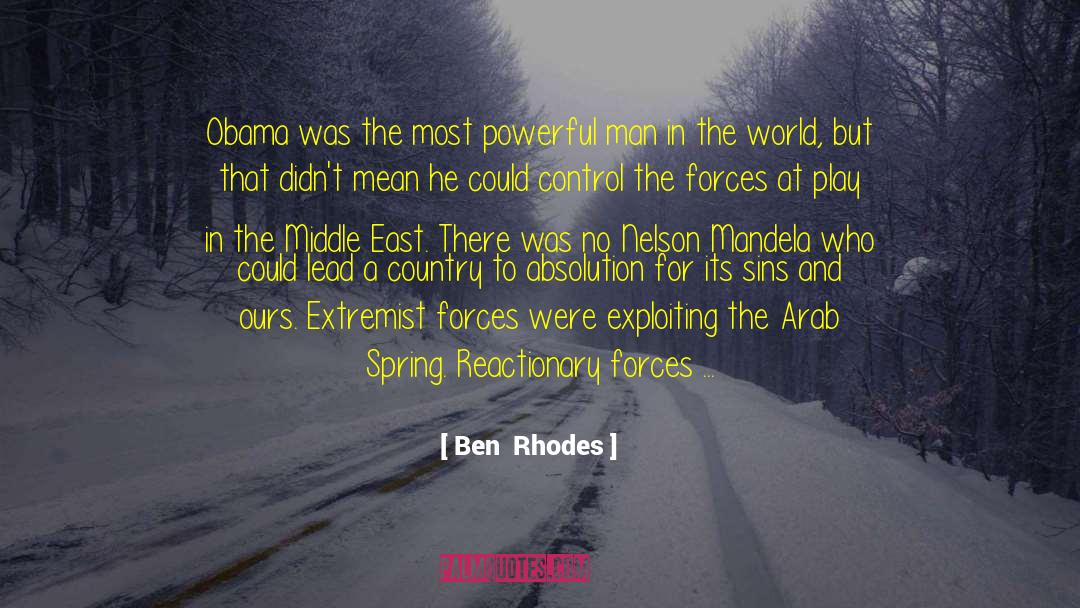
Obama met with the president of China, Xi Jinping, in a sterile hotel conference room, untouched cups of cooling tea and ice water before us. There was a long review of all the progress made over the last several years. Xi assured Obama, unprompted, that he would implement the Paris climate agreement even if Trump decided to pull out. "That's very wise of you," Obama replied. "I think you'll continue to see an investment in Paris in the United States, at least from states, cities, and the private sector." We were only two years removed from the time when Obama had flown to Beijing and secured an agreement to act in concert with China to combat climate change, the step that made the Paris agreement possible in the first place. Now China would lead that effort going forward.
Toward the end of the meeting, Xi asked about Trump. Again, Obama suggested that the Chinese wait and see what the new administration decided to do in office, but he noted that the president-elect had tapped into real concerns among Americans about "the fairness of our economic relationship with China. Xi is a big man who moves slowly and deliberately, as if he wants people to notice his every motion.
Sitting across the table from Obama, he pushed aside the binder of talking points that usually shape the words of a Chinese leader. We prefer to have a good relationship with the United States, he said, folding his hands in front of him. That is good for the world. But every action will have a
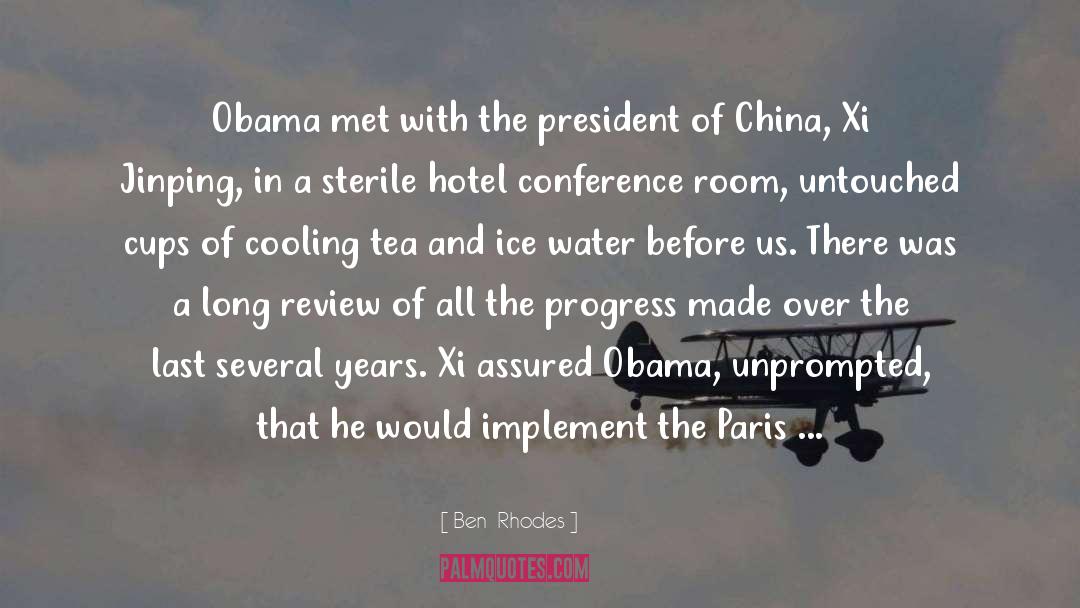
The one person who didn't seem enthusiastic about giving a speech in Berlin was Obama. When Favreau and I talked to him about it, he didn't offer much beyond suggesting we use Berlin's story to talk about what we were proposing in our own foreign policy. Chancellor Angela Merkel rejected a request from the campaign for the speech to take place at the Brandenburg Gate, where Reagan had called on Gorbachev to tear down the wall, saying that the venue should be reserved for an actual president. When he learned about this, Obama was embarrassed and annoyed. "I never said I wanted to give a speech in front of the Brandenburg Gate," he snapped. It spoke to a larger dynamic in the campaign: While Obama was often blamed for the cult of personality growing up around him - arty posters, celebrity anthems, and lavish settings for his events - he was rarely responsible for it, and worried that we were raising expectations too high in a world that has a way of resisting change.
"Before he left for Afghanistan, he read a draft of the speech and told us he was satisfied with it - "You could put this speech on the teleprompter and I'd be fine," he said - but I was hoping for more than that. I was hoping for edits that would elevate the speech and make it more than a summation of our worldview. The shift to a foreign audience hadn't been hard, as Obama's message about working across races "and religions, his preference for diplomacy over war, his embrace of the science of climate c

Our case was straightforward: The deal prevented Iran from getting a nuclear weapon. The Iranians had to remove two-thirds of their centrifuges, couldn't use their more advanced centrifuges, and had to get rid of 98 percent of their stockpile. They had to convert a heavy water reactor so it couldn't produce plutonium.
Inspectors would have 24/7 access to Iran's nuclear facilities, and the ability to access Iran's entire nuclear supply chain - from uranium mines and mills to centrifuge manufacturing and storage facilities. To cheat, Iran wouldn't just need a nuclear facility like Natanz or Fordow - they'd have to run an entirely secret supply chain. If they cheated, sanctions would snap back into place.
Then there were the consequences of not having the deal. Without it, Iran could quickly advance its nuclear program to the point of having enough material for a bomb. That would leave us with a choice between bombing their facilities and acquiescing to a nuclear-armed Iran. Holding out for a better deal was not going to work. It was diplomacy or war.
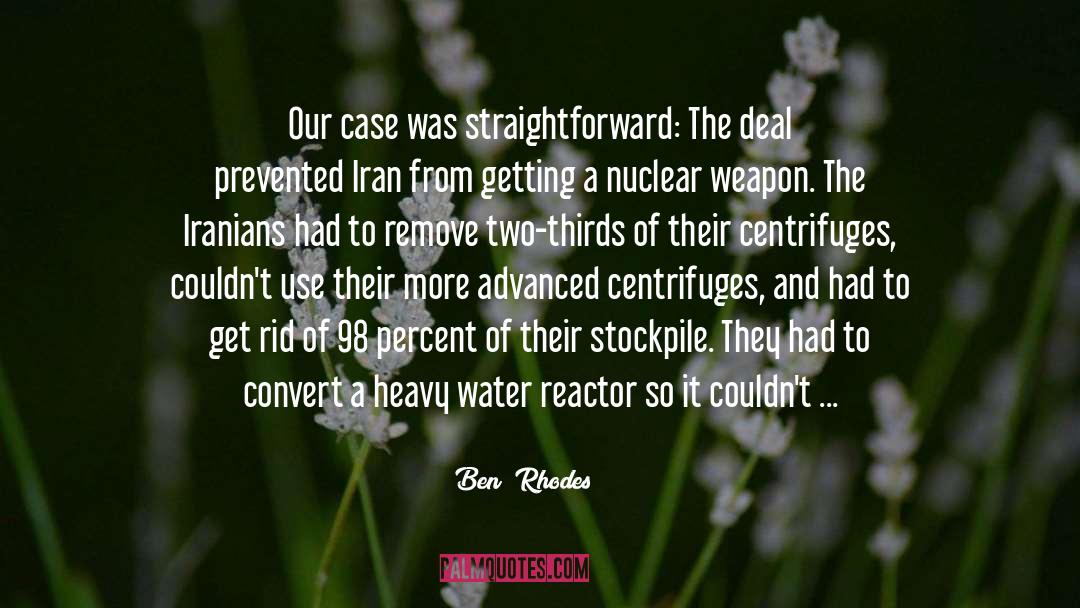
It was far easier for me to see how the war in Syria was in part an unintended consequence of other American wars, no matter how well-meaning they might have been. The toppling of "Saddam Hussein had strengthened Iran, provoked Putin, opened up a Pandora's box of sectarian conflict that now raged in Iraq and Syria, and led to an insurgency that had given birth to ISIL. The toppling of Muammar Gaddafi had made plain to dictators that you either cling to power or end up dead in a sewer. Syria looked more and more like a moral morass - a place where our inaction was a tragedy, and our intervention would only compound the tragedy. Obama kept probing for options that could make a positive difference, finding none.
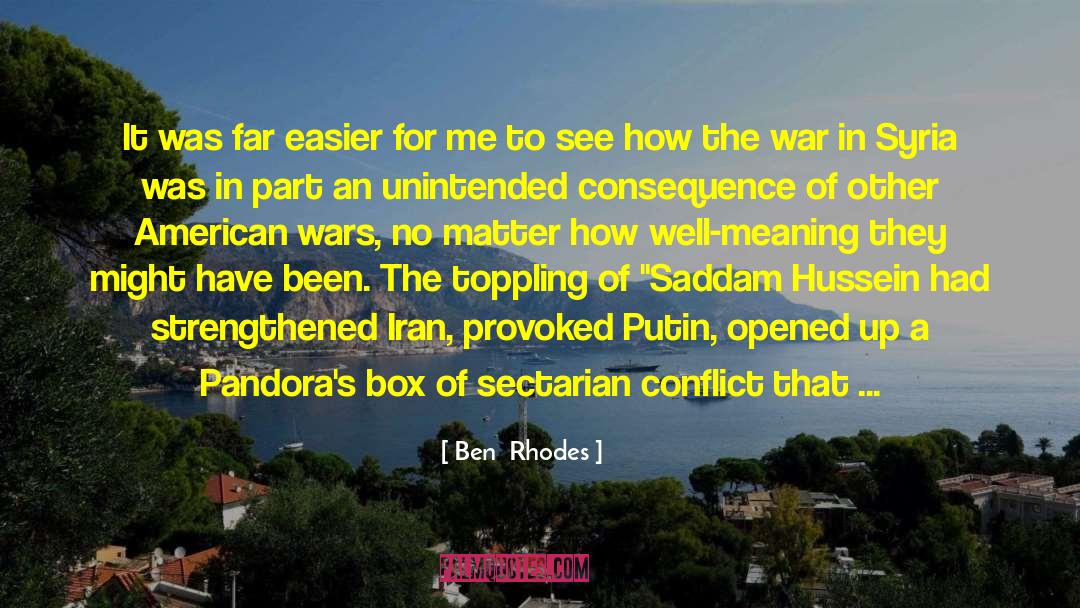
OBAMA'S FRUSTRATION WITH HIS critics boiled over during a lengthy trip to Asia in the spring of 2014. In the region, the trip was seen as another carefully designed U.S. effort to counter China. We'd go to Japan, to bring them into the Trans-Pacific Partnership (TPP) - weaving together twelve Asia Pacific economies into one framework of trade rules, environmental protections, and labor rights. We'd go to South Korea and discuss ways to increase pressure on North Korea. We'd go to Malaysia, something of a swing state in Southeast Asia, which we were bringing closer through TPP. And we'd end in the Philippines, a U.S. ally that was mired in territorial disputes with China over maritime boundaries in the South China Sea.
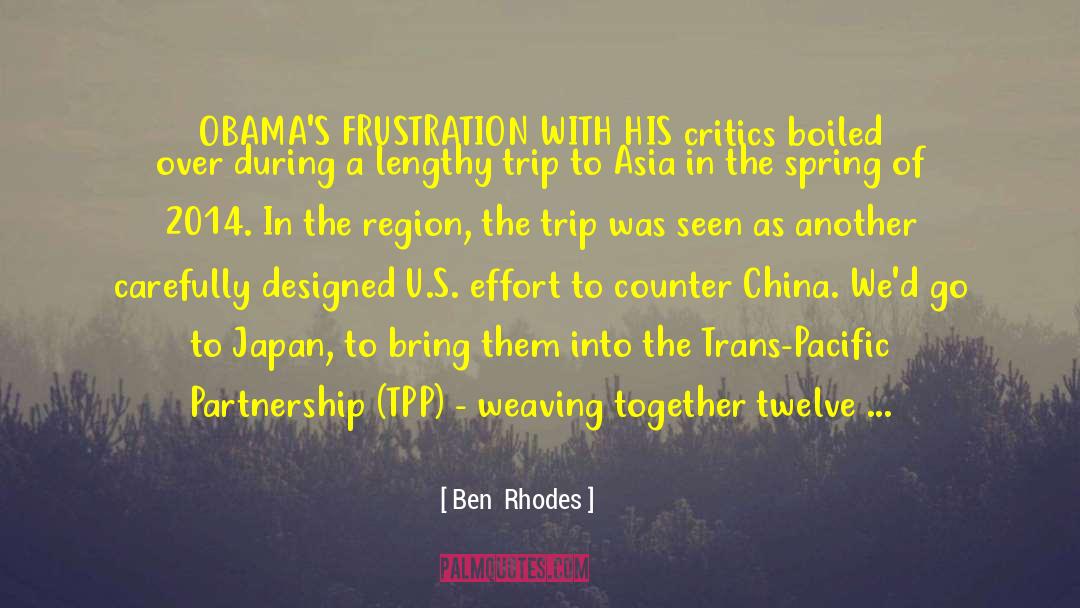
I talked to Llewellyn and got a thick briefing packet with the key arguments on both sides. The problem, for those who wanted to stay in the EU, was that many of the arguments for Brexit were built on lies: about how much the UK paid into the European Union; about how Brexit wouldn't hurt the British economy. Another problem was that the Brexit campaign was tapping into the same sense of nationalism and nostalgia that the Trump campaign was promoting back home: the days of Churchill, the absence of immigrants and intrusive international institutions. The arguments for staying in the EU were grounded in facts, not emotion: The EU was Britain's largest market. The EU offered Britain a stronger voice in global affairs. Even the name of the campaign - Remain - sounded like a concession that life wasn't going to be all that you hoped it would be.
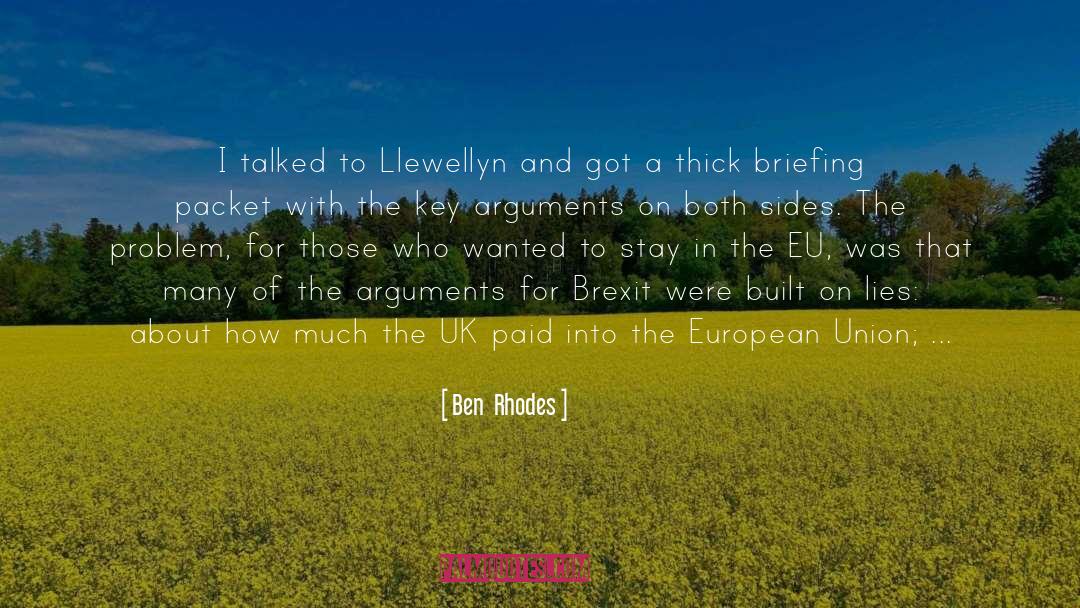
I watched the speech backstage on the teleprompter. Obama paused for a moment, and I saw the text freeze. "I'm going off script here for a second," he said, "but before I came here I met with a group of young Palestinians from the age of fifteen to twenty-two. And talking to them, they weren't that different from my daughters. They weren't that different from your daughters or sons. I honestly believe that if any Israeli parent sat down with those kids, they'd say, I want these kids to succeed; I want them to prosper. I want them to have opportunities just like my kids do. I believe that's what Israeli parents would want for these kids if they had a chance to listen to them and talk to them. I believe that." His comments were met with rolling applause, and when he dived back into the prepared text it occurred to me that this tribute - this imploring of Israelis to see Palestinians as human beings no different from themselves - might be the most he would be able to do to keep a promise to those Palestinian kids.
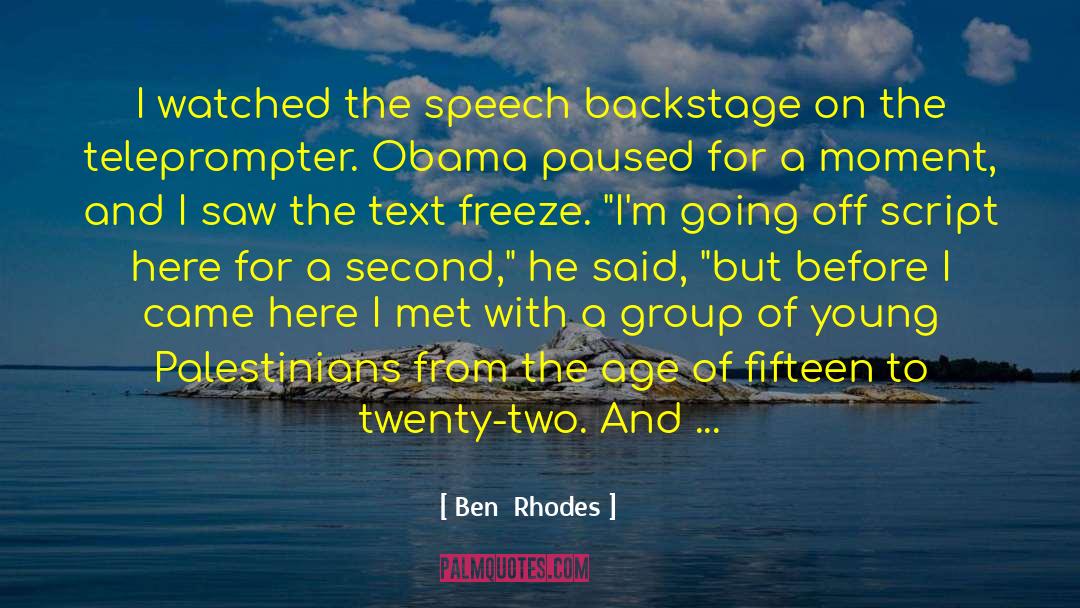
Obama occasionally pointed out that the post–Cold War moment was always going to be transitory. The rest of the world will accede to American leadership, but not dominance. I remember a snippet from a column around 9/11: America bestrides the world like a colossus. Did we? It was a story we told ourselves. Shock and awe. Regime change. Freedom on the march. A trillion dollars later, we couldn't keep the electricity running in Baghdad. The Iraq War disturbed other countries - including U.S. allies - in its illogic and destruction, and accelerated a realignment of power and influence that was further advanced by the global financial crisis. By the time Obama took office, a global correction had already taken place. Russia was resisting American influence. China was throwing its weight around. Europeans were untangling a crisis in the Eurozone.
Obama didn't want to disengage from the world; he wanted to engage more. By limiting our military involvement in the Middle East, we'd be in a better position to husband our own resources and assert ourselves in more places, on more issues. To rebuild our economy at home. To help shape the future of the Asia Pacific and manage China's rise. To open up places like Cuba and expand American influence in Africa and Latin America. To mobilize the world to deal with truly existential threats such as climate change, which is almost never discussed in debates about American national security.
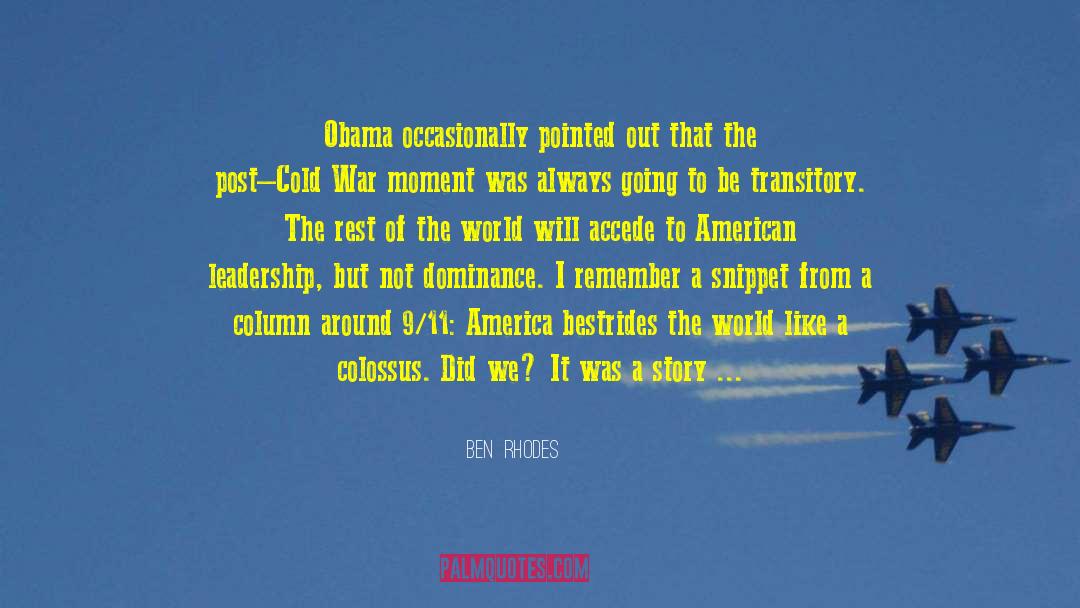
For a moment, we all just stared out the window at the crowds. "I'm reading a good book now," Obama said. "It reminds you, the ability to tell stories about who we are is what makes us different from animals. We're just chimps without it." He described how all civilization, religion, nations were rooted in stories, which could be harnessed for good or bad. Obama's tendency to take the long view was getting even more pronounced in his last year in office. But in his own way, he was also telling me that everything was okay, that this was now just one more subject in our endless conversation about everything.
"What's the book?" I asked, looking for something to grab on to.
"It's called Sapiens. You should check it out." Perhaps sensing that this was sensitive terrain, he changed the subject.

To understand what ended up happening in the 2016 presidential election, you have to understand this: When protests toppled the Ukrainian government, Putin interpreted that as the United States coming into Russia, akin to an act of war; when he launched his counterattack - annexing Crimea, creeping into eastern Ukraine - he weaponized information and showed a willingness to lie, using traditional media like television, and new media platforms like Twitter, Facebook, and YouTube, to spread disinformation into open, Western societies like a virus. Eventually, the Russians would come into America, as they believed we'd gone into Ukraine. They took advantage of the fact that we were worn down by decades of political polarization and the balkanization of our media. America's antibodies to the sickness of Russian disinformation were weak, if they were there at all.
